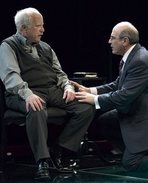SITE GUIDE
SEARCH
REVIEWS
REVIEW ARCHIVES
ADVERTISING AT CURTAINUP
FEATURES
NEWS
Etcetera and
Short Term Listings
LISTINGS
Broadway
Off-Broadway
NYC Restaurants
BOOKS and CDs
OTHER PLACES
Berkshires
London
California
New Jersey
DC
Philadelphia
Elsewhere
QUOTES
TKTS
PLAYWRIGHTS' ALBUMS
LETTERS TO EDITOR
FILM
LINKS
MISCELLANEOUS
Free Updates
Masthead
Writing for Us
A CurtainUp  London Review
London Review
 London Review
London ReviewComplicit
| We know that in the months after 9/11 the Attorney General wrote a memo to the President and his cabinet describing the Geneva Convention as being outdated and quaint.— Benjamin Kritzer
|

Richard Dreyfuss as Benjamin Kritzer and David Suchet as Roger Cowan (Photo: Manuel Harlan) |
There has been much press coverage about Richard Dreyfuss and his visible wire for prompts. I saw Complicit well into the run and didn't notice any loss of, or stumbling on lines on the part of the actor. In all fairness to Dreyfuss if the part was being rewritten by the day during rehearsals, how difficult must that be to then have perfect recall?
Benjamin Kritzer has written a prize winning book after 9/11 advocating that the US could use torture against suspected terrorists. He has since then changed his mind and now has published documents, which he has acquired from a source inside government. These incriminating documents show the United States' condoning torture. Kritzer is called to give evidence to the Grand Jury and then charged with espionage with the threat of a heavy prison sentence. His wife and counsel want him to give up his source but he isn't so sure.
What dominates the evening, which has lost thirty minutes from its programme printed running time of two and a quarter hours, is Joe Sutton's clunky dialogue. To give an example of the repetition, this from Judy, "Ben's a father. He's a father. Ben's a father. Whatever else he is, he's a father." The dialogue was so repetitive that I found myself listening to the timbre and frequency of the audience coughing.
Some of the conversations in this three hander (Dreyfuss as the journalist/writer, Elizabeth McGovern as his partner and mother of his children and Suchet as his attorney) are held on cell phones as the actors walk in a small circle pretending not to be able to see each other. Spacey writes in the programme about his idea that two of the actors should drop their phones mid-conversation and continue speaking directly to each other. The acting comes alive at this point with the actors able to make eye contact instead of staring down at their feet.
There are video clips of Dreyfuss' character Benjamin Kritzer being interviewed by the BBC's real life reporter Andrew Marr. In these clips Dreyfuss, seen seated and from the waist up, is articulate, confident and purposeful. Live onstage, his moustache shaved off, it is as if he has aged ten years, hunched, cowed, weighed down by the experience, snapping out his sentences. Elizabeth McGovern also seems to have problems maybe caused by the terrible lines she has to utter as a wife pleading for her husband not to make the children pay for his decision. It is David Suchet whose supreme professionalism alone seems to make sense of the evening, as a slick lawyer whose wheeler dealing is more a part of his job than any search for justice. "Go to prison. You won't be a hero. You won't rally the troops. You'll be forgotten." he tells Kritzer. Dreyfuss at one point asks what became of the principles of the Vietnam War Protest generation, how once they no longer had to go to Vietnam and their lives were no longer on the line, what became of their pacifism as they have aged.
The Old Vic is still arranged in the round and the set is stunning — a green glass stage divided into segments with video monitors set at interesting angles below to play snatches of newsreels. Screens drop down from above to show the pre-recorded footage which is authentic and professional. It is also very well directed in that staging in the round needs to make sure that characters aren't blocked for any period of time.
| Complicit
Written by Joe Sutton Directed by Kevin Spacey Starring: Richard Dreyfuss, Elizabeth McGovern, David Suchet Design: Rob Howell Lighting: Howard Harrison Sound: Simon Baker Video: Jon Driscoll Running time: One hour 45 minutes with an interval Box Office: 0870 060 6628 Booking to 21st February 2009 Reviewed by Lizzie Loveridge based on 5th February 2009 performance at the Old Vic, Waterloo Road, London SE1 (Tube/train: Waterloo) |
|
REVIEW FEEDBACK Highlight one of the responses below and click "copy" or"CTRL+C"
Paste the highlighted text into the subject line (CTRL+ V): Feel free to add detailed comments in the body of the email . . . also the names and emails of any friends to whom you'd like us to forward a copy of this review. |
|
London Theatre Tickets Lion King Tickets Billy Elliot Tickets Mighty Boosh Tickets Mamma Mia Tickets We Will Rock You Tickets Theatre Tickets |




